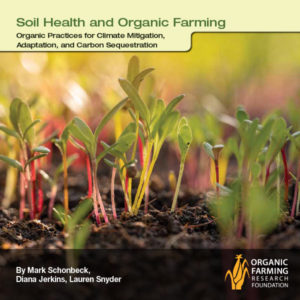Organic Practices for Climate Mitigation, Adaption, and Carbon Sequestration
Climate change threatens agriculture and food security across the U.S. and around the world. Rising global mean temperatures have already intensified droughts, heat waves, and storms, and altered life cycles and geographical ranges of pests, weeds, and pathogens, making crop and livestock production more difficult. Intense rainstorms aggravate soil erosion and complicate water management, and higher temperatures accelerate oxidation of soil organic matter. Warming climates modify crop development regulated by growing degree-days or “chill hours,” and threaten production of perennial fruit and nut crops that have strict chilling requirements to initiate growth and fruit set. Thus, agricultural producers have a major stake in efforts to curb further climate change, as well as improving the resilience of their farming and ranching systems to the impacts of climate disruption.



